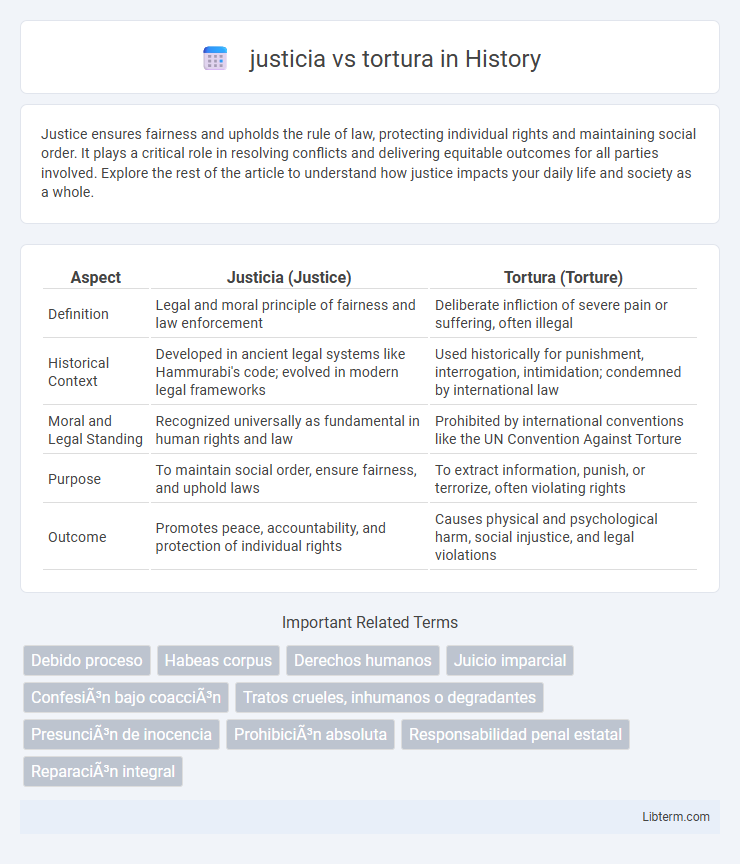Justice ensures fairness and upholds the rule of law, protecting individual rights and maintaining social order. It plays a critical role in resolving conflicts and delivering equitable outcomes for all parties involved. Explore the rest of the article to understand how justice impacts your daily life and society as a whole.
Table of Comparison
| Aspect | Justicia (Justice) | Tortura (Torture) |
|---|---|---|
| Definition | Legal and moral principle of fairness and law enforcement | Deliberate infliction of severe pain or suffering, often illegal |
| Historical Context | Developed in ancient legal systems like Hammurabi's code; evolved in modern legal frameworks | Used historically for punishment, interrogation, intimidation; condemned by international law |
| Moral and Legal Standing | Recognized universally as fundamental in human rights and law | Prohibited by international conventions like the UN Convention Against Torture |
| Purpose | To maintain social order, ensure fairness, and uphold laws | To extract information, punish, or terrorize, often violating rights |
| Outcome | Promotes peace, accountability, and protection of individual rights | Causes physical and psychological harm, social injustice, and legal violations |
Definición de Justicia: Conceptos Fundamentales
Justice is the principle of moral rightness and fairness, ensuring individuals receive what they are due according to laws and ethical standards. It involves impartiality, accountability, and protection of human rights, contrasting sharply with torture, which violates human dignity and legal norms. Key concepts include equity, rule of law, and the pursuit of truth to uphold social order and individual freedoms.
¿Qué es Tortura? Perspectiva Legal y Moral
Tortura se define legalmente como cualquier accion que cause dolor o sufrimiento intenso, fisico o mental, infligido intencionalmente para obtener informacion, castigar, intimidar o discriminar, prohibida por leyes internacionales como la Convencion contra la Tortura de la ONU. Moralmente, la tortura es rechazada por violar los derechos humanos fundamentales y la dignidad inherente a toda persona, siendo una practica degradante e inhumana que destruye la justicia y la etica social. La justicia busca preservar el respeto a los derechos y la integridad, mientras que la tortura representa una ruptura profunda con estos principios esenciales.
Historia de la Justicia y la Tortura
Throughout history, justicia (justice) has evolved as a system for ensuring fairness and legal order, contrasting sharply with the use of tortura (torture) as a method of extracting information or punishment. Early legal codes, such as the Code of Hammurabi, emphasized justice principles while later societies employed torture during inquisitions and interrogations. Modern jurisprudence rejects torture, promoting human rights and lawful procedures as central to contemporary justicia.
Derechos Humanos: Justicia Frente a Tortura
Human Rights frameworks establish justice as a fundamental principle opposing torture, emphasizing accountability and reparations for victims. International treaties like the UN Convention Against Torture mandate state obligations to prevent, investigate, and punish acts of torture. Upholding justice through these mechanisms strengthens human dignity and promotes legal protection against inhumane treatment.
Legislación Internacional: Prohibición de la Tortura
International legislation firmly prohibits torture under various treaties such as the United Nations Convention Against Torture (CAT), which mandates state parties to prevent and punish acts of torture worldwide. The CAT requires signatory nations to enact laws criminalizing torture, ensure accountability for perpetrators, and provide victims with rehabilitation and remedies. Regional instruments like the European Convention on Human Rights also reinforce the absolute ban on torture, emphasizing justice mechanisms that protect human dignity.
Ética y Filosofía: Justicia Versus Prácticas Crueles
Etica y filosofia evaluan la justicia frente a la tortura destacando la inviolabilidad de los derechos humanos fundamentales y la dignidad inherente a toda persona. La justicia se basa en principios de equidad, respeto y legalidad, mientras que la tortura representa una violacion extrema que contradice valores eticos como la humanidad y la integridad moral. En el debate filosofico, la tortura nunca se justifica, pues socava la legitimidad del sistema legal y deshumaniza tanto a victimas como perpetradores.
Impacto Social de la Tortura en la Búsqueda de Justicia
The social impact of torture severely undermines the pursuit of justice by eroding public trust in legal institutions and perpetuating cycles of violence and fear within affected communities. Torture creates long-lasting psychological trauma and social stigmatization, which hinder victims' ability to participate effectively in judicial processes. This erosion of social cohesion impedes accountability and reforms, making justice systems less transparent and inclusive.
Mecanismos de Prevención y Denuncia de Tortura
Effective mecanismos de prevencion y denuncia de tortura incluyen la implementacion de protocolos rigurosos para inspecciones regulares en centros de detencion y la creacion de organismos independientes con facultades para recibir denuncias y proteger a las victimas. La capacitacion continua de agentes del estado en derechos humanos y la promocion de una cultura de respeto a la dignidad humana son esenciales para prevenir abusos. Ademas, la accesibilidad a sistemas legales y el apoyo a las organizaciones de vigilancia fortalecen la transparencia y la rendicion de cuentas en casos de tortura.
Justicia Restaurativa: Alternativa al Castigo Violento
Justicia Restaurativa offers a transformative approach by prioritizing dialogue and mutual agreement between victims and offenders, reducing reliance on violent punishment methods. This model emphasizes repairing harm and fostering accountability, which contributes to healing communities and lowering recidivism rates. Implementing restorative justice practices demonstrates significant success in creating equitable resolutions that respect human dignity and promote social harmony.
Desafíos Globales: Erradicar la Tortura para Concretar la Justicia
Global efforts to eradicate torture are crucial for establishing true justice, as torture undermines human rights and the rule of law. International organizations like the United Nations and Amnesty International emphasize strict enforcement of legal frameworks such as the UN Convention Against Torture to prevent abuses. Strengthening accountability mechanisms and promoting transparency within judicial systems remain key challenges in addressing the global impunity surrounding torture.
justicia Infographic

 libterm.com
libterm.com